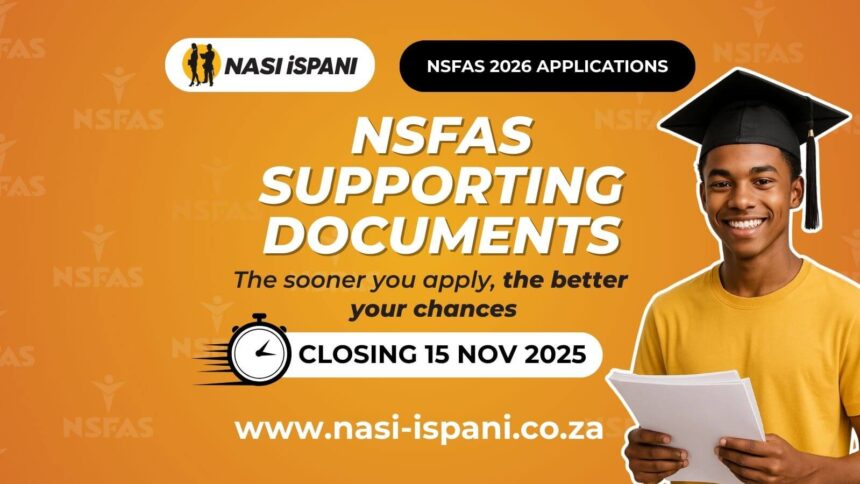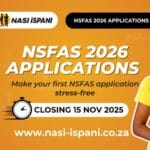Applying for NSFAS 2026 applications can feel exciting, but let’s be honest—it can also feel a little stressful. One of the biggest reasons students face delays or declined applications is missing or incorrect supporting documents. The good news? With a little preparation, you can get everything ready, make your application smooth, and improve your chances of funding.
- Get Your Supporting Documents Right – Yes, It Matters
- 1. Your ID and Proof of Citizenship
- Showing Your Household Income Correctly
- Your School and College Records
- If Your Family Gets a SASSA Grant
- Extra Documents for Students with Disabilities
- Other Documents You Might Need
- Avoid These Common Document Mistakes
- Your Quick Checklist for NSFAS 2026 Applications
- Not Sure if You Have Everything?
- Final Tips for a Smooth NSFAS 2026 Application
This guide is part of our NSFAS 2026 information series and focuses entirely on the documents you need to submit.
We’ll break it down step by step, so you know exactly what to gather and how to prepare it for your application.
Get Your Supporting Documents Right – Yes, It Matters
Think of supporting documents as your way of proving your story to NSFAS. They help verify everything in your application, from your identity to household income, academic progress, and any extra support you might need.
Here’s why they’re so important:
- They confirm your South African citizenship
- They show your household income, which determines if you qualify
- They prove your academic eligibility
- They help NSFAS provide extra support if you have a disability
Missing or unclear documents can delay your NSFAS 2026 applications, so getting them right from the start is a huge time-saver.
1. Your ID and Proof of Citizenship
Using Your South African ID for Your Application
Every applicant must provide proof of citizenship. You can use:
- ID book
- Smart ID card
- Passport showing South African citizenship
Tips:
- Make sure your ID is valid and matches the details on your application.
- Scan it clearly—blurry photos or crooked scans can slow things down.
New applicants: Submit your ID with your first application.
Returning students: Check that your ID hasn’t expired.
When You’ll Need Your Birth Certificate
You might need your birth certificate if:
- You’re under 18 and don’t have a smart ID yet
- There’s a name discrepancy or you were recently adopted
Always submit a certified copy, not the original.
Using Your Passport to Prove Citizenship
If you’re a naturalized citizen or have dual citizenship, your passport can help prove your South African status. Make sure it’s clear and up to date.
Showing Your Household Income Correctly
Household income is a big factor in NSFAS 2026 applications.
Income limits:
- Standard: ≤ R350,000/year
- Students with disabilities: ≤ R600,000/year
What counts as income:
- Salaries, wages, bonuses
- Pensions or UIF
- Rental income or certain allowances
Special scenarios:
- If your parents don’t work but an older sibling supports the household, their income counts.
- Students living independently must provide proof of their own income.
- Single-parent households should submit the parent’s income.
Documents you’ll need:
- Recent payslips (last 3 months)
- UIF certificates or official statements for unemployed guardians
- Affidavits confirming unemployment or financial hardship
New applicants: Include income proof for all household contributors.
Returning students: Check that your household income hasn’t changed since last year.
Pro tip: Scan documents clearly and double-check numbers. Signed affidavits must be official.
Your School and College Records
Submitting Your High School Results
- Required for all new applicants
- Must meet minimum admission criteria for your program
- Always submit a certified copy, not originals
Returning Students: What Records to Include
- Provide transcripts showing passed modules
- Ensures you meet NSFAS’s academic progress rules (≥50% of modules passed and N+1 rule compliance)
Moving from TVET to University: What You Need
- Provide transcripts from your previous institution
- NSFAS checks past academic performance for continued eligibility
Tip: Upload clear scans and label documents properly. Keep originals safe.
If Your Family Gets a SASSA Grant
If your family receives a SASSA grant, you may qualify automatically.
- Qualifying grants: Child Support, Disability, Foster Child Grants
Required documents:
- SASSA grant reference number
- Proof of grant (official letter or statement)
New applicants: Submit these with your first application
Returning students: Confirm your grant status hasn’t changed since last year
Extra Documents for Students with Disabilities
Students with disabilities get extra support and a higher household income threshold. You’ll need:
- Disability Annexure A form
- Medical or psychological reports
New applicants: Submit Annexure A with supporting documents.
Returning students: Update if your circumstances or support needs have changed.
Extra NSFAS support can include assistive devices, learning aids, or transport assistance.
Learn more: How to Submit Missing Documents to NSFAS
Other Documents You Might Need
Some students need extra documents for special situations:
- Affidavits for orphans or child-headed households
- Proof of guardianship or foster care
- Letters explaining hardship or special circumstances
- Proof of residence (utility bills, municipal accounts)
Tip: Submit these early and label them clearly—it helps NSFAS process your application faster.
Avoid These Common Document Mistakes
- Submitting blurry scans or low-quality documents
- Missing documents or unsigned affidavits
- Forgetting to update returning student records
- Sending originals instead of certified copies
Pro tip: Use the NSFAS checklist and keep digital copies for backup.
Your Quick Checklist for NSFAS 2026 Applications
| Document | Who Needs It | Notes / Tips |
|---|---|---|
| South African ID | All applicants | Valid ID, smart ID, or passport |
| Birth Certificate | Under 18 / no ID | Certified copy |
| NSC / High School Results | New applicants | Certified copy |
| Previous Academic Transcripts | Returning students / transfers | Certified copy, shows module passes |
| Proof of Household Income | All applicants | Payslips, UIF, affidavits |
| SASSA Grant Documents | Grant recipients | Reference number, proof of grant |
| Disability Annexure A | Students with disabilities | Attach medical/assessment reports |
| Special Circumstances Documents | Orphans, child-headed households, guardians | Affidavits, letters, proof of residence |
Not Sure if You Have Everything?
Even if some documents are missing, submit what you have for your NSFAS 2026 applications. NSFAS verifies all information and may request missing items later. Early submission gives you time to gather everything needed for approval.
Remember: Applying is always better than missing the opportunity.
Final Tips for a Smooth NSFAS 2026 Application
Submitting the right supporting documents for NSFAS 2026 applications makes the process easier and faster. Preparing your ID, household income proof, academic transcripts, SASSA grant documents, and any special documents ahead of time increases your chances of approval.
Even if you’re unsure about some documents, apply anyway. NSFAS will guide you through verification and updates. Proper preparation helps you focus on your studies and ensures a stress-free start to 2026. Stay organized, apply early, and give yourself the best shot at funding your education.



